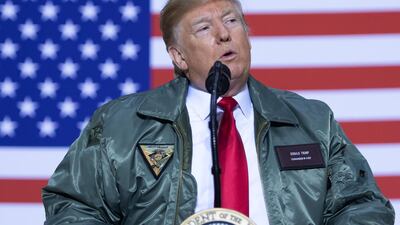It is hard to know who was most insulted by Donald Trump's remarks during his long overdue visit to US troops in harm's way – the men and women in uniform he addressed in Iraq or the dead of all the countries subjected to American military intervention since the 9/11 attacks. America, the president told US troops at Al Asad airbase in Iraq, would no longer be the world's "sucker", fighting other nations' battles. This appeared to suggest that the troops who had fought and died overseas since 2003 were also, by association, suckers and overlooked the fact that America had marched uninvited into Afghanistan, Iraq and Syria.
It was, said Mr Trump, up to each nation to decide "what kind of sacrifices they are willing to make". But his speech failed to acknowledge the enormous responsibility he is now abrogating in the region. Fifteen years after the US invasion, Iraq is still struggling to navigate a path forward with clear, strong governance. In Syria, the sudden announcement of a US withdrawal of troops has meant a scramble for sides, with Turkey massing troops on the border and preparing for a face-off against the regime-backed Kurds, while Russia is calling for the US to hand over its Syrian holding posts to Bashar Al Assad.
Yet Mr Trump used his Boxing Day visit to celebrate his withdrawal of US troops from Syria, in the process succeeding only in highlighting the contradictions underlying the decision. ISIS, he has insisted, is “largely defeated”. Yet US troops would remain in Iraq to prevent an ISIS resurgence there and to give the US a base in case “we wanted to do something in Syria”. Iraq, which is considering sending troops to Syria, also fears the return of ISIS to its soil.
The consequences of America’s withdrawal will be felt most by the people of Syria, to say nothing of America’s abandoned Kurdish allies. At home, it prompted the resignation of his defence secretary James Mattis, followed by Brett McGurk, the US presidential envoy to the Global Coalition to Defeat ISIS, who condemned a “reckless” policy reversal.
History will be the best judge of the past 17 years of American intervention in the Middle East – which led to an ongoing war in Afghanistan, years of suffering and chaos in a still unstable Iraq and, arguably, contributed to the emergence of ISIS. But one does not have to wait to conclude that, having cut the region’s artery, it is indeed reckless for America to take its finger off the wound before it is fully healed.

